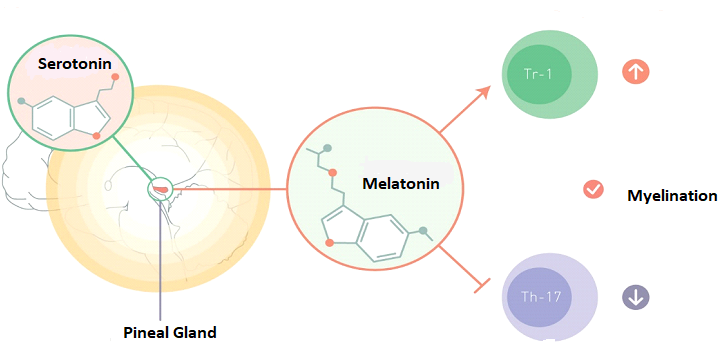
Assertion- Melatonin influences the menstrual cycle, pigmentation and defense capability.
Reason- Melatonin plays an important role in the regulation of the diurnal rhythm of our body.
A. If both assertion and reason are true and reason is the correct explanation of assertion
B. If both assertion and reason are true but reason is not the correct explanation of assertion
C. If assertion is true but reason is false
D. If both assertion and reason are false
Answer
515.1k+ views
Hint: Melatonin is secreted by the pineal gland. It does affect the pigmentation of the body. As this is the hormone secreted for giving pigmentation. The levels of blood also appear to be following the daily cycle of the day and night as it increases at night. Through night and drops too low at noon. Because of this day-night rhythm in the body it is termed as a biological clock.
Complete answer:
Hormone control and their coordination is done by endocrine glands. One such gland is called a pineal gland that secretes the hormone melatonin. Melatonin as the assertion here claimed does influence the menstrual cycle, pigmentation and defense capability. Melatonin is known to be the biological clock hormone which may produce circadian rhythms. It is called a clock as it works like a cycle. The levels of hormones increase and decrease as like the time of clock and it does affect the sleep cycle.
Reason shows melatonin plays an important role in the regulation of the diurnal rhythm of the body. Yes, it does involve the sleeping cycle as well as the menstrual cycle. It affects the levels and secretion of FSH and LH and also the oxytocin levels. FSH- follicle stimulating hormone. LH- luteinizing hormone.
FSH stimulates the growth and development of follicles in the ovary and LH manages the regulation of the cycle. So, melatonin does not work on the regulation of the menstrual cycle. Melatonin affects the pigmentation up-to some extent as melatonin is basically known for their control over the diurnal activity of the body. Pigmentation is automated by a hormone called melanin which is also known as skin hormone. Which shows the skin pigment and difference in color in the human body.
Thus, affirmation is correct and the reason is correct, but not the right explanation of assertion.

Note:
Melatonin is a hormone that releases mainly at night in the pineal gland. Commonly called sleep-wake hormone. As a dietary supplement, it is often used for the short-term treatment of insomnia. If a person is suffering from lack of sleeping, he or she can start taking sleep medications. But it should not get habituated as it detreats health when taken in excessive amounts.
Complete answer:
Hormone control and their coordination is done by endocrine glands. One such gland is called a pineal gland that secretes the hormone melatonin. Melatonin as the assertion here claimed does influence the menstrual cycle, pigmentation and defense capability. Melatonin is known to be the biological clock hormone which may produce circadian rhythms. It is called a clock as it works like a cycle. The levels of hormones increase and decrease as like the time of clock and it does affect the sleep cycle.
Reason shows melatonin plays an important role in the regulation of the diurnal rhythm of the body. Yes, it does involve the sleeping cycle as well as the menstrual cycle. It affects the levels and secretion of FSH and LH and also the oxytocin levels. FSH- follicle stimulating hormone. LH- luteinizing hormone.
FSH stimulates the growth and development of follicles in the ovary and LH manages the regulation of the cycle. So, melatonin does not work on the regulation of the menstrual cycle. Melatonin affects the pigmentation up-to some extent as melatonin is basically known for their control over the diurnal activity of the body. Pigmentation is automated by a hormone called melanin which is also known as skin hormone. Which shows the skin pigment and difference in color in the human body.
Thus, affirmation is correct and the reason is correct, but not the right explanation of assertion.

Note:
Melatonin is a hormone that releases mainly at night in the pineal gland. Commonly called sleep-wake hormone. As a dietary supplement, it is often used for the short-term treatment of insomnia. If a person is suffering from lack of sleeping, he or she can start taking sleep medications. But it should not get habituated as it detreats health when taken in excessive amounts.
Recently Updated Pages
Master Class 11 Computer Science: Engaging Questions & Answers for Success

Master Class 11 Business Studies: Engaging Questions & Answers for Success

Master Class 11 Economics: Engaging Questions & Answers for Success

Master Class 11 English: Engaging Questions & Answers for Success

Master Class 11 Maths: Engaging Questions & Answers for Success

Master Class 11 Biology: Engaging Questions & Answers for Success

Trending doubts
One Metric ton is equal to kg A 10000 B 1000 C 100 class 11 physics CBSE

There are 720 permutations of the digits 1 2 3 4 5 class 11 maths CBSE

Discuss the various forms of bacteria class 11 biology CBSE

Draw a diagram of a plant cell and label at least eight class 11 biology CBSE

State the laws of reflection of light

Explain zero factorial class 11 maths CBSE




